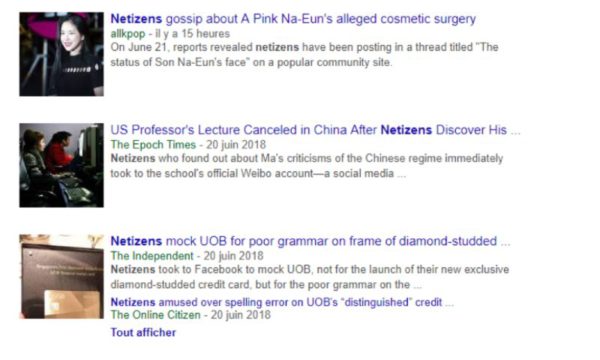Far from innocent jargon, the word ‘netizen’ has political implications in its use today and should not be casually tossed around, says Beijing-based journalist Dave Yin. In this op-ed contribution, Yin responds to our recent article “Netizens or Not?“
It’s unlikely that when internet theorist and author Michael F. Hauben coined the word “netizen” more than thirty years ago, he would have imagined that, one day, on the other side of the world, a few handfuls of Western reporters and media critics covering China would be divided: in one camp applauding and in the other cursing his creation. It’s equally unlikely he’d recognize at first glance what his word has come to mean in 2018 – and to whom.
Common thought is that whether or not “netizen” should be used, and what it means, are at the heart of this debate, which by now spans publications both big and small, free and censored. It hasn’t gotten us anywhere.
But in view of China’s escalation of online policing and digital surveillance, the concept of “netizen” is evolving, as must its coverage in Western media. Far from innocent jargon, the word today has political implications and a growing potential for harm, one Western media must recognize if it is to conduct responsible reporting.
A Western interpretation
When considering the word “netizen,” it helps to know what one is talking about. Namely, pick a definition, and stick with it.
Scenario A)
One clear-cut definition offered by the Atlantic designates a unique identity; young, wealthy, educated Chinese urbanites and/or politically active individuals in online communities adept at skirting censorship.
Here, simple protocol applies. Writers using “netizen” must first make sure the subjects of their story actually match this description. Then, they must assess whether these complex socioeconomic and political elements are evident in this word. Hint: they’re not. Inevitably, writers should be explaining these elements to accompany the use of this term in each article it appears in. Anything short of this is incomplete reporting.
Scenario B)
If broadly defined to be a synonym to “Chinese internet users,” as is more often the case, then several questions emerge: Why do Chinese internet users need a special label in the first place? Why is “Chinese internet user” inadequate when this type of terminology works for everyone else? If research (paywall) suggests the online habits of Chinese are similar to the rest of us, what are we trying to accomplish by othering them?
Self-applied labels
In advocacy reporting, we try to respect a person’s self-applied labels, such as with race or sexual orientation, so I appreciate the irony when I say that just because Chinese people call themselves “netizens” doesn’t necessarily mean we should.
Be it when describing race, sexual orientation, disability, etc. there is a general effort to use terminology that centers the person, and not the circumstance, which is often complex. “Person with impaired vision,” “a cisgender gay man,” “the woman, who identifies as a second-generation Filipino immigrant,” “individuals claiming to be members of the Anonymous collective” are infinitely better than “the blind,” “the gay,” “the Filipino,” “Anonymous.” In pieces where nuance and individuals matter, these words do more than fill up space.
“Netizen,” as it is currently used, erases both.

What’s more, these often political labels emerged in societies with freedom of association where one makes a statement simply by publicly identifying. By contrast, what does it mean to label yourself with something as vague and abstract as “netizen” in a society that doesn’t allow such freedom, and what effect does it have when Western media take up this cause?
A Chinese strategy
The self-applied label argument is also unsound when you consider that “netizen” is actually a mistranslation of the word “wǎngmín” (网民).
In wǎngmín 人民 (people), nóngmín 农民 (farmer), jūmín 居民 (resident), yímín 移民 (migrant), yúmín 渔民 (fisherman), and míngē 民歌 (folk song), “mín” 民 simply means “people,” without any “citizen” connotation, and therefore “wǎngmín” 网民 really just means “internet people/people on the internet.”
In other words, “netizen” and “wǎngmín” are faux amis. It’s a mistake that Western media has allowed to proliferate and one that we must now contend with.
While the use of the English word by ordinary Chinese and private Chinese media could boil down to guileless ignorance towards English nuance, by contrast, “wǎngmín,” when applied by the Chinese government and its mouthpieces, is part of deliberate national policy. As described by Manya Koetse in her analysis, the Chinese term is an official category of Chinese nationals on which the CCP imposes severe restrictions.
What ramifications are there for Western media in not consciously decoupling these wildly different interpretations by different actors? By casually tossing the word around, do we not run the risk of normalizing Chinese internet policy?
While we, working in the Far East, may feel at times that our work is isolated, it should be noted that people are, in fact, reading, for better or worse.
“[‘Netizen’] has been used when reporting on China for a decade+ [sic] in order to relieve journalists of understanding what they’re reporting on,” one Reddit user (Western netizen?) writes. “Today it is a lazy way to assume all internet users in China think the same way by f*cking lazy journalists.”
“Netizen” may well stick around. China’s emerging digital policies have all but ensured it. But we owe it to our readers and the people we cover to get with the program, to evolve our terminology and critical judgment at the same pace as the subject matter.
We need to understand that the benefits of its selective, judicious use, as a result of explicit purpose, come from highlighting and decoding China’s socioeconomic and political situation, not from generalizing 772 million individuals, and least of all from othering them or normalizing their constraints. It may help everyone’s understanding of this country, including our own.
By Dave Yin
Spotted a mistake or want to add something? Please let us know in comments below or email us.
©2018 Whatsonweibo. All rights reserved. Do not reproduce our content without permission – you can contact us at info@whatsonweibo.com.


 China Insight3 months ago
China Insight3 months ago
 China Music4 months ago
China Music4 months ago
 China Digital10 months ago
China Digital10 months ago
 China Arts & Entertainment12 months ago
China Arts & Entertainment12 months ago
































